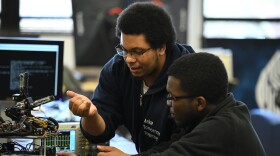New voices are joining the controversial conversation over whether the United States owes reparations to the descendants of African slaves. College students like the ones at Shaw University in Raleigh, North Carolina have literally joined the debate.
Erika Alexander and Whitney Dow are co-directors and producers of the film, It tells the story of Evanston, Ill. and passage of the first tax-funded reparations bill for Black Americans in the country.
Most of the outspoken voices for and against reparations are from older people, politicians and activists. Alexander says she helped organize debates at HBCUs on the topic to hear what young folks had to say.
鈥淚 was very inspired by the 1965 James Baldwin- William Buckley debate. I watch it all the time. I thought it would be great to try to replicate it but around the subject of reparations,鈥� said Alexander. 鈥淭he idea was to include students to take the radioactivity off of this word.鈥�
The debate Alexander was referring to was in February 1965 at the University of Cambridge in England. The topic of the Baldwin versus Buckley debate: .
There is an audio clip of Baldwin from that debate in 鈥淭he Big Payback鈥� film. Baldwin says 鈥淚 picked the cotton. And I carried it to market. And I built the railroads under someone else鈥檚 whip for nothing. For nothing!鈥�
During the month of March, 鈥淏ig Payback鈥� debates took place at several Historically Black Colleges and Universities across North Carolina, including North Carolina Central University in Durham and North Carolina A&T State University in Greensboro.
At Shaw, 20-year-old Christian Jacques of Elkridge, Maryland prepared to speak in support of reparations. He said family members gave him ideas to consider.
鈥淢y mom is actually here today. She said she wanted to come hear me speak on this topic,鈥� said Jacques. 鈥淢y side and I feel pretty confident we鈥檙e ready.鈥�
Zaid Steele also said she was ready. The 21-year-old from Kansas City, Missouri debated against reparations.
鈥淚 talked to my grandma because her and my granddad were both in the Black Panther party,鈥� said Steele. 鈥淪he honestly didn鈥檛 pick a side but she did really give me an eye opener to both sides.鈥�
Reparations for the descendants of the African enslaved in this country, can look several different ways. Tuition for education, housing, cash payments, have all been discussed.
Jacques was the first to speak, dressed in a formal black suit, white shirt, and striped necktie. He went right in, listing reparations for Japanese Americans and The Marshall Plan, when the U-S provided billions of dollars in foreign aid after World War II.
鈥淪lave owners benefitted from the unpaid labor of slaves which helped them to build multi-generational wealth,鈥� said Jacques. 鈥淭his fact, in itself, is a tremendous disgrace to Blacks and their forefathers in the past considering all that they have laid down for this country.鈥�
Jacques ended his initial statement with support of H.R. 40, the Commission to Study and Develop Reparation Proposals for African Americans Act.
鈥淭his is why H.R. 40 is such a paramount matter,鈥� said Jacques. 鈥淚t would be the lead-way into the country finally issuing an apology, not only apologizing for its dark history but for every Black American to embrace the American dream.鈥�
While Jacques laid out his support of reparations, Steele pressed for answers. She stretched to get situated at the podium, wearing black and white pants, a black sweater, white blouse and green natural loc鈥檇 hair for style. Steele questions H.R. 40 and the wide array of reparations plans across the country. She said they will not solve anything.
鈥淲hat does 'eligible' look like? You can look at my skin and know that I鈥檓 Black,鈥� said Steele. 鈥淗ow is it true for African Americans who suffered the same backgrounds of slavery get a different amount of money?鈥�
Steele is referring to recent news about a draft reparations proposal out of San Francisco. One suggestion from a city-appointed reparations committee was to give eligible Black adults a lump-sum payment of $5 million.
鈥淏ut let us not forget, where is this money coming from?鈥� said Steele. 鈥淭he same community we built should not be divided by money.鈥�
The audience voted by applause. The team supporting reparations won this debate. Paulette Dillard, President of Shaw University, welcomed the exercise.
鈥淚鈥檓 actually quite excited to have today鈥檚 young people be interested in the topic and actually want to engage about because we鈥檝e not found it easy to get them civically engaged,鈥� said Dillard. 鈥淭o have a program around reparations is actually very exciting.鈥�
Alexander and the other filmmakers said they will continue to raise money and sponsor this debate at HBCUs and predominately white institutions, also known as PWIs. Alexander says the goal is to convince President Joe Biden to sign an executive order showing his support for House Resolution 40. But note, H.R. 40 does not spell out who is eligible for reparations, how much should be paid or how to pay for it.






